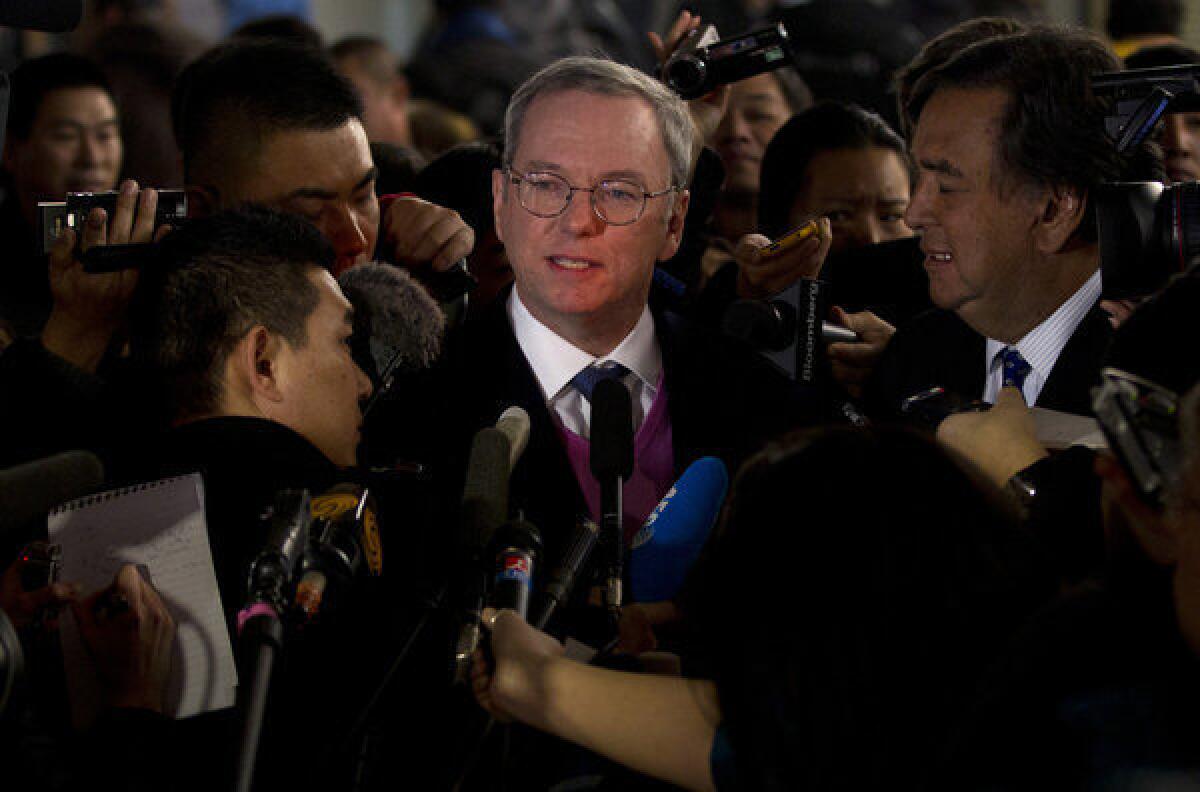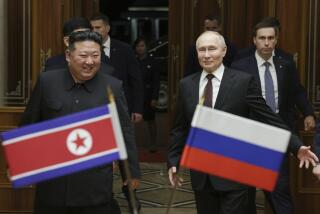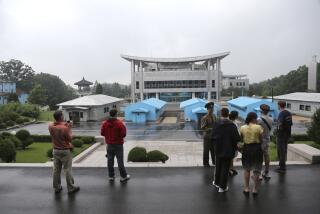Google chief urges North Koreans to get connected

- Share via
BEIJING — Could Google drag North Korea kicking and screaming into the 21st century?
Eric Schmidt, executive chairman of the world’s most popular search engine, on Thursday urged the world’s most Internet-shy nation to open up or risk falling further behind the developed world.
“As the world becomes increasingly connected, their decision to be virtually isolated is very much going to effect their physical world, their economic growth and so forth, and it will make it harder for them to catch up economically,” Schmidt told reporters at Beijing airport while en route home from Pyongyang, the North Korean capital. “It’s time for them to start or they will remain behind.”
Schmidt’s four-day trip to Pyongyang, as part of a private mission led by former New Mexico governor Bill Richardson, drew criticism and skepticism. The State Department loudly voiced its disapproval of any outreach to a county that last month shot off a long-range missile in defiance of international warnings.
One stated goal of the trip – to secure the release of an imprisoned American, Kenneth Bae, a 44-year-old tour operator – did not produce much in the way of tangible results. The delegation was not permitted to visit him, although Richardson said Thursday they were informed he was in good health and had managed to pass on a letter from his son.
Although now under the leadership of the world’s youngest head of state, Kim Jong Un, who celebrated his 30th birthday this week, North Korea lags far behind in connectivity. Unlike tech-savvy South Korea, one of the world’s most wired nations, North Korea has made itself a virtual black hole in the Internet as part of its overall rejection of foreign influences.
Foreign television, books, magazines, music and movies are for the most part illegal. Less than half of the nation’s 24 million people have telephones at home, and those that do are barred from calling overseas.
Schmidt and Richardson visited a library at the elite Kim Il Sung University, named for the reclusive state’s late founder and the current leader’s grandfather, and chatted with students who had limited Internet access and were searching in Cornell University’s library online.
“People were not able to use the Internet without somebody else watching them, it appeared,” Schmidt said. He noted that North Korea’s mobile telephones, introduced about four years ago, can’t currently access the Internet but that technological hurdles were not insurmountable.
“It would be very easy for them to turn that on,” said Schmidt.
North Korea experts say the obstacles to introducing the Internet are more political than technological.
Unlike China, which merely blocks access to sensitive political topics, the North Korean regime — to perpetuate its own existence — needs to prevent its population from discovering how much poorer they are than their neighbors.
“Impossible,” declared Andrei Lankov, a Kim Il Sung University graduate who is now a professor at South Korea’s Kookmin University. “If people had access to the Internet, in a matter of minutes they would learn that most South Korean households have private cars, which is unimaginable to them.”
Internet access is restricted to elite scholars at a few universities, among them the Pyongyang University of Science and Technology, which was opened in 2010 by evangelical overseas Koreans. “They do have to report the sites they visit, but otherwise they are given relative freedom in using the Internet for their study and research,” said Norma Nichols, a school official, in an email.
More common in universities is a closed system known as the intranet.
“It is a somewhat reduced and out-of-date version of the Internet. Scholars who go overseas often bring back material and they are often ransacking the net and putting up things that are appropriate,” said Stuart Thorson, a professor of political science at Syracuse University who has been working with the North Koreans for a decade to improve information technology.
When he first started in 2002, he was told there were only 10 people in the entire country with unfettered Internet access.
“While the number has changed, it is clear that it is a political decision who accesses it and how much,” said Thorson.
ALSO:
Three female Kurdish activists slain in Paris
In China, press censorship protests continues
Union Jack reappears over Belfast City Hall, briefly
More to Read
Sign up for Essential California
The most important California stories and recommendations in your inbox every morning.
You may occasionally receive promotional content from the Los Angeles Times.










